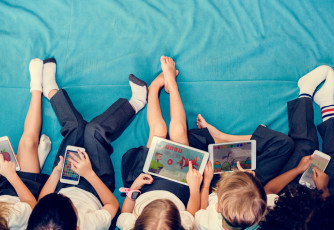
About Digital teaching materials
Interesting! Digital technology usage in different European countries
European Commission’s project [1], during which more than 200 families from 21 countries were interviewed, concluded that one of the most important factors in teaching children the use of digital tools is the inclusion of parents in that process. Parents agree that usage and understanding of digital tools can be challenging and educational institutions should play a role.
If these technologies are being integrated in the learning process and they are used for practical objectives, parents can contribute a lot more and children become more motivated to learn these skills that are obligatory not only for the future job market, but for today’s as well.
Research, that has been done within the European Union’s project of digital technologies and their usage amongst children ages 0 to 8. [2]
Belgium
Technologies are used in a few kindergartens, however, all of the children start using them when they start 1st grade, because from then on technologies are integrated in the learning process. That means that children can access technologies and learn how to use them, even if some of them do not have these digital technologies at home. in kindergartens their usage usually borders with playing educational games.
Top three activities that are associated with the usage of digital tools are watching Youtube videos, playing games and watching TV. Usually they are used for entertainment purposes and children tend to use them for educational means only when specifically directed by parents or teachers.
It also obviously shows that children can prioritize other activities other than digital, and they also associate their “outside” activities with whatever they choose to do in the digital world, for example, if a child is interested in football, he or she is more likely to also play football related games on computer and be interested in exercises that use football analogies.
Denmark
Denmark’s government is pro usage of technologies in kindergartens and schools, however, each kindergarten chooses to use these digital tools differently, because they have not implemented a joint methodology.
Children, who are under 8 years old, rarely use technologies. Even if they play games or sometimes watch YouTube videos, they never engage in online communication with other people. Children do not also clearly understand what the internet really is or how to keep in mind any safety restrictions that need to be used when using technology. Parents believe that this knowledge has to be acquired later in life, not at the ages of 0 to 8.
In Denmark bigger attention is put on critical thinking and active usage of technologies in later stages of development.
Finland
Technologies are used in schools, not kindergartens. Even though in Finland education is mandatory from the age of 6, there are longer maternity and paternity leaves and care centers are more popular. Kindergartens also do not offer any academic learning, therefore there is no practical use of these digital tools.
Exactly like in Belgium, technologies are used for entertainment purposes, if teachers or parents have not specifically directed children to do otherwise. However, if children do need to use digital tools for educational purposes, they know how to find resources that match their learning style, for example, if they learn better by absorbing audio visual information, they will find videos, if they learn better by reading, they find articles and texts, etc.
More children engage in digital activities instead of outdoor activities, for example, if a few years ago children played with dolls, they are more likely to play out the same scenarios but on computer games.
Parents, just like in Denmark, are not too worried about safety aspects at this age.
Germany
Technologies are used in kindergartens, however, there is no joint methodology or regulations. In schools active usage of technologies starts with primary school.
Usually parents are worried about children using technologies at this age, worrying about the fact that their children might be spending too much time looking at TV or computer screens and the negative effects that might have. Worrying about kids’ physical and mental health and the effect technologies have on that is more relevant at this point than understanding the positive effects technologies might bring.
Children more than ever use social media because that incompases all of the functions needed, for example, listening to music, communication with others, finding information, entertainment. Parents also use functions that restrict the usage of digital technologies for their children such as limiting the time they spend on devices, blocking specific webpages.
Italy
Kindergartens have a joint programme for the usage of technologies created by the Ministry of Education in 2015, that encourages kindergartens to use these digital tools, educates teachers, and already in kindergarten introduces children to programming. The name of the project is National Plan for Digital Schools: The Good School and the main tool is a digital teacher.
Actively communication platforms such as Whatsapp are used.
Even though parents aren’t too preoccupied with safety restrictions, two aspects that are seen as the most dangerous are tricks that encourage children to buy different products (“empty” promises) and the worry that using technologies for long periods of time can leave negative effects.
Norway
In Norway digital skills are one of the mandatory skills that have to be learnt during school. Because of that, digital tools are used in kindergartens as well. The two main skills within that are communication and finding information.
Children also learn to use the knowledge gained through digital means in the “outside” world, for example, with different games, projects and tricks.
Parents have a really positive outlook on technologies as they are integrated in the learning process.
References
1. https://ec.europa.eu/jrc/en/news/boosting-children-s-digital-literacy-urgent-task-schools
2. https://ec.europa.eu/jrc/en/publication/eur-scientific-and-technical-research-reports/young-children-0-8-and-digital-technology-qualitative-study-across-europe

 Log In
Log In